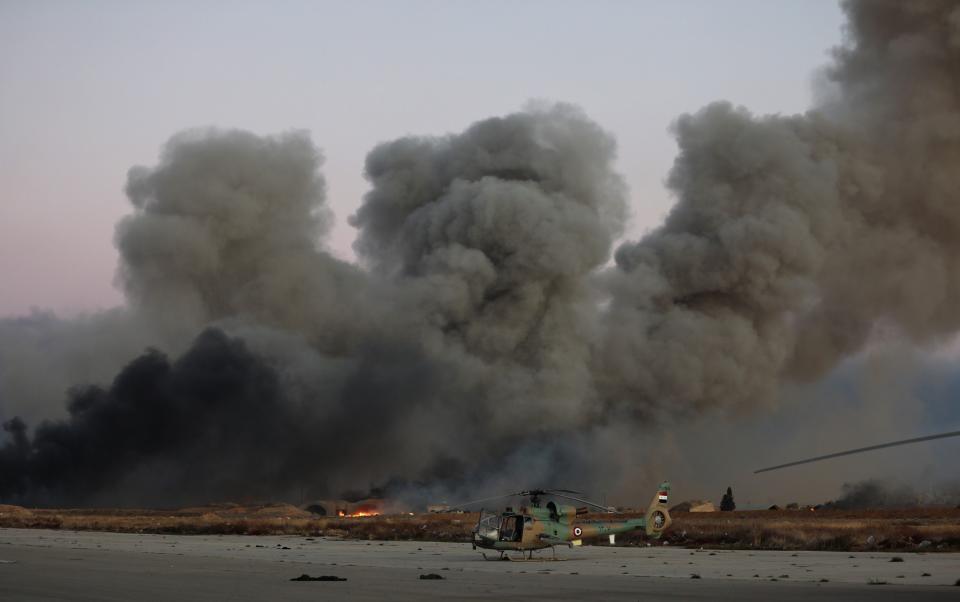Israel has seized land along its border with Syria and carried out air strikes on Damascus.
Benjamin Netanyahu said IDF troops had captured a buffer zone in the Golan Heights on the same day a lightning rebel offensive toppled the Syrian government of Bashar al-Assad.
Mr Netanyahu said the move was to protect Israeli residents after Syrian troops abandoned positions, and after rebel fighters infiltrated the UN monitored area.
It came as Israeli fighter jets began a bombardment of weapons sites in Damascus, as the Jewish state took preventive measures to quash weapons leftover from the Assad regime getting into the hands of extremists.

The alleged Israeli airstrikes hit the Mazzeh district of Damascus on Sunday, according to one Lebanese and one Syrian security source speaking to Reuters. Additionally, jets believed to be Israeli bombed the Khalkhala air base in southern Syria that was evacuated by the Syrian army overnight.
According to Reuters, at least six strikes hit the main air base in the north of the city of Suwayda that has a large stockpile of rockets and missiles left by Syrian troops.
Among the stockpiles are long-range rockets, surface-to-surface missiles and chemical weapons.
More strikes targeted a security complex and a government research centre which it has said in the past was used by Iran to develop missiles, two regional security sources told Reuters.

They caused extensive damage to the main customs headquarters and buildings adjoining the military intelligence offices within the security complex, which is located in the Kafr Sousa district of Damascus.
The research facility was also damaged, the sources said, speaking to Reuters on condition of anonymity.
One of the sources said the strikes had hit infrastructure used to store sensitive military data, equipment and guided missiles parts.

Israel has watched the rapid overthrow of Assad’s government with a mixture of hope and concern as officials weigh the consequences of one of the most significant strategic shifts in the Middle East in years.
Assad was supported during the country’s long civil war by Iran and Russia.
Israeli officials have expressed concern that chemical weapons and other prohibited munitions and missiles that Syria had kept for decades could now fall into the hands of the Islamist-led rebels who stormed into Damascus on Sunday.
The Islamist leader of the group leading the Syrian rebellion, Abu Mohammad al-Jolani, head of Hayat Tahrir Al Sham (HTS) and a former al-Qaeda fighter, has long been vocal in his opposition to Israel.
Growing up in Saudi Arabia until the age of seven, he then moved to Damascus where his grandfather had been displaced following the 1967 Six-Day War in which Israel took control of the Golan Heights.
He says he was radicalised by the second intifada in 2000, one of the most bloody times of the Israel-Palestine conflict.
In 2021, he told PBS Frontline: “I was 17 or 18 years old at the time, and I started thinking about how I could fulfil my duties, defending a people who are oppressed by occupiers and invaders.”
On Sunday, Ehud Yaari, an Israeli Lafer international fellow of the Washington Institute said: “The concerns about chemical weapons and heavy missiles falling into the hands of the rebels are certainly justified, but let us remember that there is a huge distance between seizing chemical materials and the ability and, of course, the desire to use them.”
The Israeli military did not comment on the reported strikes when approached by The Telegraph.

“We have to take action against possible threats,” Mr Netanyahu said Sunday. “One of them is the collapse of the Separation of Forces Agreement from 1974 between Israel and Syria.
“This agreement held for 50 years. Last night, it collapsed,” he added, after militia fighters entered the 50 mile long buffer zone and tried to take over a UN outpost and the Syrian army abandoned its position.
“We gave the Israeli army the order to take over these positions to ensure that no hostile force embeds itself right next to the border of Israel. This is a temporary defensive position until a suitable arrangement is found,” Mr Netanyahu said.
Following Mr Netanyahu’s instructions to seize control of the buffer zone, Herzi Halevi, Israel’s Chief of Staff, confirmed that on Saturday night, forces had begun ground operations.
“Ground troops are engaged in combat on four fronts: against terrorism in Judea and Samaria, in Gaza, in Lebanon, and last night we deployed troops into Syrian territory,” he said on Sunday.
“We have excellent ground troops working together, infantry, armour, engineering, and artillery, and they are co-operating with other branches of the IDF: air, sea, and intelligence,” Mr Halevi said as the country braces for any possible onslaught of Islamic extremists on its Syrian border.
X / @danny_makki
Israel captured the Golan in the 1967 Mideast war and later annexed it. The international community, except for the United States, views it as occupied, and the Arab League on Sunday condemned what it called Israel’s efforts to take advantage of Assad’s downfall to occupy more territory.
Israel is on high alert after last year’s Oct 7 atrocities in which thousands of Hamas fighters infiltrated Israel, killing over 1,100 mostly civilians and taking over 250 more hostage.
Hezbollah in Lebanon, on Israel’s northern border, was also planning an Oct 7-style attack which has seen Israel blitz the terror group’s infrastructure and leadership in recent months.
Mr Netanyahu said that the collapse of the Syrian regime was “the direct result of our forceful action against Hezbollah and Iran, Assad’s main supporters”, referring to two direct hits on Iran as the two countries’ shadow war came out into the open with two direct attacks from each side this year.
EMEA Tribune is not involved in this news article, it is taken from our partners and or from the News Agencies. Copyright and Credit go to the News Agencies, email news@emeatribune.com Follow our WhatsApp verified Channel





